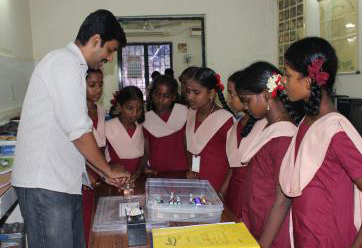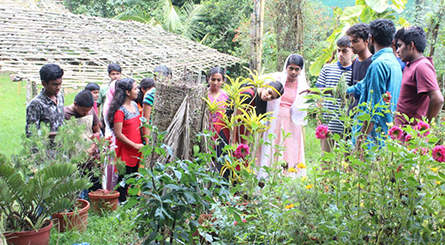Every Child A Scientist
A program anchored by the M S Swaminathan Research Foundation , towards furthering education for children in science, art, and cultural aspects of biodiversity
Article 13 of the Convention on Biological Diversity (CBD) emphasises the need for public education and awareness about the importance of, and the measures required for, the conservation of biological diversity. The use of and the inclusion of biodiversity topics in educational curricula have also been highlighted. The Global Biodiversity Strategy (WRI IUCN, UNEP 1992) suggests that the national biodiversity curricula focus on contributions to community food, health, and livelihood welfare. However, even a decade after the adoption of the CBD, biodiversity education remains a challenge in several developing countries. As a result, students and teachers are losing opportunities to understand the significance of their surrounding biotic world and its various ecological, economic, physical, and cultural manifestations.
The M S Swaminathan Research Foundation (MSSRF) initiated a biodiversity education program in January 2002 targeting tribal and rural school dropouts of Wayanad. Five years ago, the institution conceptualised and developed a community-level institution known as the ‘Community Agrobiodiversity Centre’ (CAbC) primarily to build the capacities of village men and women through education and empowerment to use resources in a sustainable and equitable manner. ‘Every Child a Scientist’ is a concept developed by Prof. M S Swaminathan with the objective of furthering education for children in science, art, and cultural aspects of biodiversity at MSSRF CAbC. The name of the program draws inspiration from Carl Sagan, who said “Everybody starts as a scientist. Every child has the scientist’s sense of wonder and awe.” This program intends to impart basic knowledge on bio-resources conservation and its sustainable utilisation among students. A curriculum has been designed to equip the students to understand more about the environment, status and value of natural resources, scientific utilization of resources, and current issues pertaining to the governance of bio-resources.

Various hands-on experiments, water quality testing, seed germination, soil pH measurements, and slide preparation on mitosis and meiosis have been part of the training program. Exposure trips to biodiversity-rich areas also form part of the field trips. This would also give the students a fair idea of which direction/sector to choose in their career pursuits. So far, 120 Students have availed the benefits of the program

Go2C's serves in an advisory role to ‘Every Child A Scientist’ and has also sponsored an edition of the event.